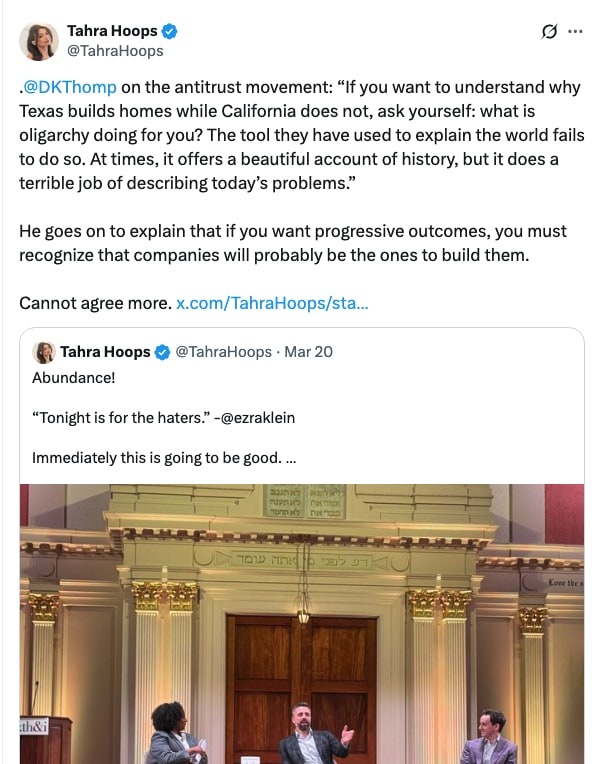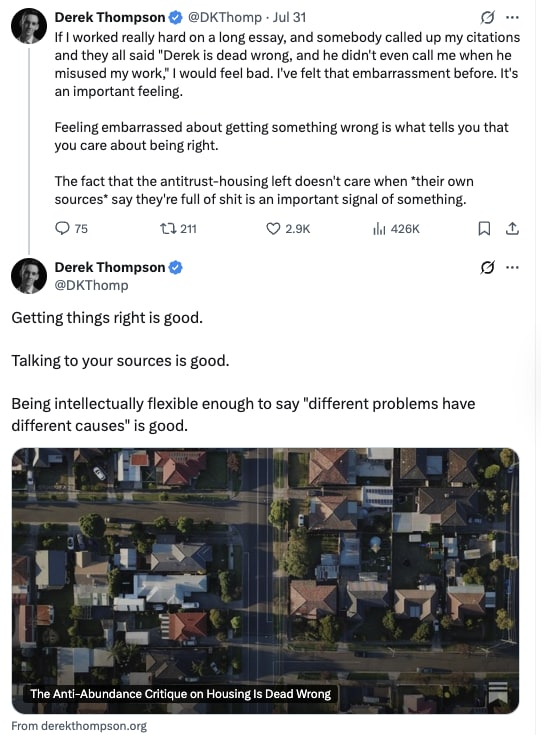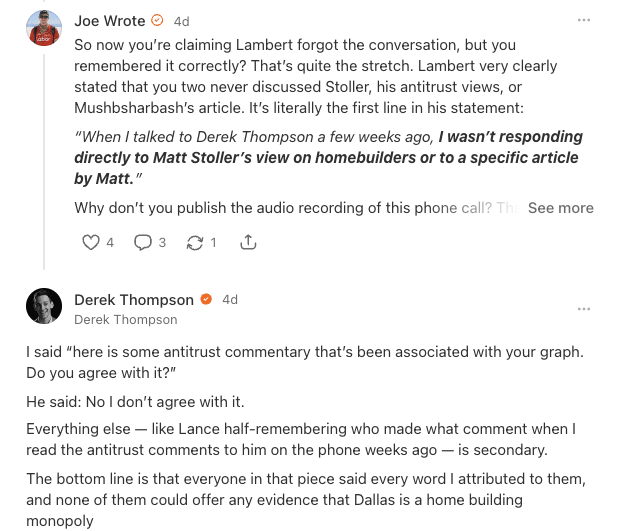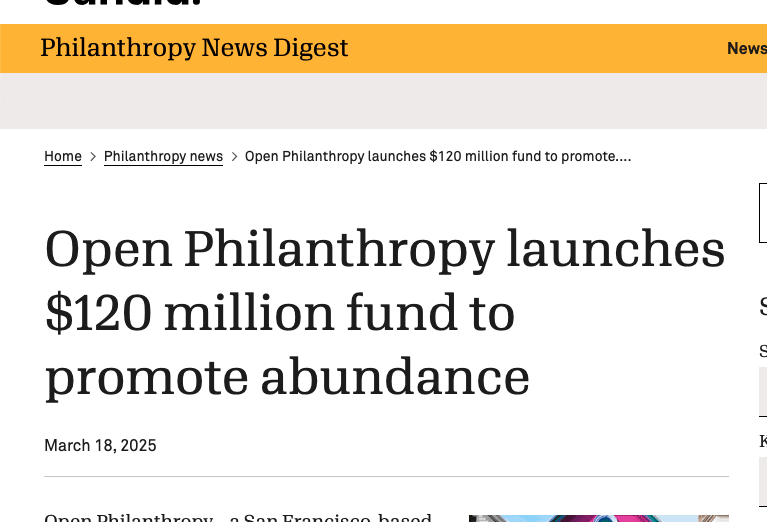There’s a famous scene in the movie Annie Hall illustrating the dream of every competitive person engaged in an argument. Woody Allen is annoyed by a man in line making loud pompous comments to his date about media scholar Marshall McLuhan. So Allen in a sequence breaking the fourth wall pulls McLuhan into the movie, and McLuhan says to the man, “You know nothing of my work!” The scene is iconic and still cited today, because it is so fundamentally satisfying. It brings control to argument — a sense of truth and objectivity that real life lacks.
The tactic of showing someone’s own sourcing to disprove their claims is used often in politics. And a well-known writer just tried to do it to BIG. Derek Thompson, a former writer for The Atlantic, wrote an article titled The Anti-Abundance Critique on Housing is Dead Wrong. I’m going to explain this article, not just for its intrinsic substance, but because it is, in microcosm, quite revealing about the nature of modern politics, and how opponents of populism operate.
Thompson is very skilled, a latter-day slightly-less-talented version of Malcolm Gladwell, who can make the upper class chatter. For instance, he recently wrote about how young people aren’t partying or drinking much anymore, which is a perfect topic for a 15 minute conversation between two lawyers in DC. Subjects like automation taking jobs, weight loss drugs, the fabulous innovation at Google, etc., are his bread and butter. He’s got the right timing and framing to generate some buzz.
Thompson is also highly political, and a classic liberal anti-populist. For instance, in April, at the height of concern over Trump’s trade fracas, Thompson attacked Bernie Sanders, saying that Sanders’ carping over the superrich is counterproductive because Democrats “need the oligarchy” to stand up to Donald Trump on tariffs. I’m not kidding, he says that directly in the video below.
Recently, Thompson, together with New York Times podcast star Ezra Klein, wrote a best-selling book called Abundance, with the goal of reorienting the Democratic Party around anti-populism after Joe Biden’s loss. Though it has generated a lot of coverage, much of the book is uncontroversial. One theme is that we should build more of the stuff we use — be it housing, or solar panels, or what have you — and I agree with that. There are also general proposals for reforming land use regulation in there I agree with, which Derek and Ezra drew from the vibrant world of housing reformers.
That said, there’s no discussion of finance or capital allocation in the book, so it doesn’t really hold together as a coherent theory of how we should go about building stuff, or do anything else really. It doesn’t say much about banks, monopolies, markets, or intellectual property. There’s a whole section about the historical roll-out of penicillin in there and it somehow doesn’t mention patents. In other words, for something purporting to articulate a whole new posture on political economy for the Democratic Party, there’s very little in there to go on.
But that’s not really the point of the book. It’s mostly a political pamphlet, and marketing object, disguising a critique of the very idea that we should pursue fairness in markets, or that we need to govern our commerce at all in order to get what we want out of it. Thompson and Klein believe the reason things are so expensive in America has little to do with monopolies, financial control, or corporate abuse. To them, the real problem is that we’re not nice enough to the big capitalists who would build more stuff and drive down prices if only we (and our government) would get out of their way. Specifically, they articulate the fundamental problem to be an entrenched class of homeowners, environmentalists, and unions, all of whom throw up obstacles to building stuff — trapping the rest of us in malaise and disaffection.
What I appreciate about Abundance is that there’s now more focus on housing costs, which we’ve covered a bit here at BIG. Over the last couple years, we’ve been trying to understand housing markets — which are quite complex — in more depth. The last installment in that effort — an article titled “Messing with Texas: How Big Homebuilders and Private Equity Made American Cities Unaffordable” — was published in May. In it, Basel Musharbash analyzed the general evolution of the homebuilding industry over the last three decades while using Dallas-Fort Worth (DFW) metro area as a case study. DFW is, of course, in Texas, which is a red state that Thompson and Klein have lauded for building a lot of housing. What Musharbash found, however, is that DFW isn’t some nirvana of plentiful and affordable housing. Instead, he found that DFW had seen a significant slow-down in per capita housing construction over the past two decades and experienced a tripling of home prices since 2011.
Musharbash is himself a long-time pro-development YIMBY (Yes in My Backyard) advocate when it comes to local land use regulation, but his analysis of the homebuilding industry showed that DFW’s affordability crisis is not just a zoning story, and not at all a story of process liberalism run amuck. As he explains in the article, multiple factors—including a collapse in financing for small builders, the consolidation of large builders, the imposition of production discipline on the industry by Wall Street investors, the rise of an infrastructure for collusion among builders, vertical integration of mortgage financing and building, and the entrance of private equity-style purchasers into the single family housing market—have all contributed to the current lack of supply and resulting affordability crisis in the DFW metro area.
It’s a fascinating piece, with extensive research showing how a set of changes in financial policy after the Savings and Loan Crisis in the early 1990s permanently shrank the availability of bank capital to smaller builders, crimping supply, and how financial policy after the Great Financial Crisis in 2008 fostered institutional buying of single family homes, increasing demand and driving up house prices.
Musharbash’s critique was meant to prod Klein and Thompson. And there were many ways for them to respond to his analysis. The most reasonable would have been to do a deep dive into Dallas housing markets of their own and analyze his arguments about finance, small builders, and housing production on the merits. Unfortunately, Thompson didn’t do that. He responded, not with substance, but with an attempt at an Annie Hall style fourth wall sequence. He called up several people Musharbash cited for discrete points, and then wrote how those people, like McLuhan in Annie Hall, purportedly disavowed BIG.
Thompson then went further, arguing that our method shows the entire anti-monopoly movement itself lies in disrepute. We find monopolies where they don’t exist, he said, like doctors seeking to put a “healthy patient into chemo” because of our cavalier disdain for evidence. “America deserves a better antitrust movement with better evidence,” he concluded, more in sadness than anger. It was well-written, compelling piece, and I’m sure that, if I were a fan of Thompson and didn’t know any better, I’d pump my fist after reading it and say “yeah, got ‘em” with a sense of satisfaction.
Unfortunately, it wasn’t remotely truthful.
Joe Wrote, a labor organizer and writer, described what happened:
Last week, Thompson published an essay calling the anti-trust housing left — and I quote — “full of shit.” In the article, Thompson critiques a paper by Basel Musharbash published in BIG by Matt Stoller that argues corporate consolidation and private equity investment increased home prices in Dallas, Texas. Thompson, quite boastfully, claimed he called one of Musharbash’s expert sources, Lance Lambert, who (according to Thompson) said Musharbash had ‘distorted my points to reach dubious, or even flatly wrong, conclusions.’
WOW. That’s a serious accusation. If true, it would mean Musharbash (and by extension, Stoller) is an unapologetic liar with no journalistic integrity, only bending facts and misrepresenting others’ words to fit his ideal conclusion. It would also disprove the leading critics of corporate housing conglomeration, solidifying Abundance-style deregulation as the optimal path for the future of left-of-right politics. The only problem, is that Lance Lambert says Derek Thompson never asked him about Musharbash’s paper! In a statement posted on X/Twitter, Lambert clarified that Thompson never even mentioned Musharbash’s article.
When I pointed out to Thompson that now he was the one whose sources were saying he was full of shit, he claimed that Lambert ‘misremembered,’ and that they had discussed the Stoller/Musharbash paper.
I cannot believe I have to say this to a self-described journalist, but if a reporter writes ‘My source said X, Y, Z,’ and then the source says they did not say ‘X, Y, Z’, the reporter has two options: either release a recording of the conversation proving what was claimed, or issue a retraction. (Thompson stopped replying to me when I pressed him on this, leading me to believe he didn’t record the phone call in question.) There are two interpretations of what happened. The first, harsher interpretation is that Derek Thompson did exactly what he accused the anti-trust left of doing: misrepresenting Lance Lambert’s words to support his desired conclusion that the housing market needed deregulating. The generous interpretation of these events is that Thompson did mention Musharbash’s article, but not enough to make it clear to Lambert that his words would be used to accuse someone he personally knows of fabrication.
It wasn’t just Lambert. I contacted another source Thompson quotes, an economist named Luis Quintero. Quintero told me that he never repudiated the BIG piece, since he didn’t know it existed when Thompson interviewed him, and Thompson never showed it to him or mentioned it in their interview. It turns out what Thompson did was essentially ask several people cited in Musharbash’s piece — none of whom had read the BIG article or had done any independent analysis of the DFW homebuilding industry’s behavior — if they could conclude based on raw market shares or other data Thompson supplied that an illegal cartel was running homebuilding in DFW. With some strategic quotes in hand from this deception, he then wrote his article implying that Musharbash’s “sources” disavowed his arguments, when nothing of the sort occurred. (Indeed, Quintero is writing his own response to Derek’s piece to correct the mistaken impression Derek conveyed of his views, not just on Basel’s article, but on the effect of financial and corporate consolidation on housing supply in general.)
In addition to presenting a flattened and falsified version of Basel’s corporate-consolidation argument to his interviewees and then manipulating their quotes to convey a false impression of their views on Basel’s article (which, again, they had not read), Thompson ignored the finance and private equity parts of Musharbash’s article entirely. Throughout his piece, Thompson used the term “antitrust” as a catch-all for people concerned about oligarchy and concentrated power, referring to the critics he is responding to as the “antitrust left,” and “antitrust critics,” and “antitrust housing folks.” But Musharbash’s piece didn’t really focus on direct monopolization schemes or other conduct that violates the antitrust laws; it was mostly about how a series of financial policy changes transformed the homebuilding industry so it produced fewer and more expensive houses. But honestly relaying Basel’s article wouldn’t have let Thompson play his game.
And play it Thompson did, over and over, misleading readers so often and in such petty ways that it is hard to keep track. As another example, he ascribed a piece I wrote on dialysis in 2024 to economist James Roberts’ 2019 paper on the industry, saying that his paper “made such a splash in the antitrust space that Stoller himself called dialysis ‘the scariest monopoly I’ve ever found.’” The reason Thompson pretended this economist was my inspiration for a piece on dialysis was so that he could interview Roberts and get him to say something to the effect of “I don’t think there’s a housing cartel in Dallas.”
The thing is, I wasn’t inspired by Roberts. I tweeted about the dialysis market power problem — which has been widely known for a long time — all the way back in 2018, a whole year before Roberts’ paper came out. My 2024 article on dialysis was based on Tom Mueller’s incredible 2023 book, “How to Make a Killing: Blood, Death and Dollars in American Medicine,” which is something I noted in the second paragraph of the piece, calling it “one of the best non-fiction books I have ever read.” And the reason I found dialysis scary isn’t because of anything Roberts did or said, but because of a Congressional hearing in which a patient explained that clinicians would hurt them if they chose. “You do not want to make them mad,” one patient told the assembled Senators, “because they have this needle as big as a 10 penny nail; they can make you behave.” That’s what was scary, not a paper by an economist at Duke. But that detail didn’t fit Thompson’s argument, so he deceived his readers and pretended I had used a source who later disavowed me.
To be fair, not all of what Thompson wrote was sleazy. Some of it is was just incoherent. In terms of a rebuttal to Musharbash’s piece, Thompson made two claims. First, he said, Dallas builds a lot of houses, so that’s evidence there isn’t much of a problem. “Steadily rising construction per capita in a fast-growing city seemed like a weird example of monopolistic abuse,” he noted. Second, yes, he conceded, housing prices have tripled in less than 15 years, but that’s because Dallas has bad zoning restrictions. When pushed, he claims, well, Dallas did a lot of building, but it could have done more on the margin (and leaves us to suppose that this marginal increase would have prevented the three-fold increase in home prices).
One can debate the reasons Dallas became unaffordable, but one can’t argue that there is an adequate supply of housing when it’s convenient for one rhetorical point, and that there is an inadequate supply of housing when it’s convenient for another rhetorical point. I am guessing there is going to be a lot more research in this area, so we’ll learn more soon about the effects of changes in homebuilding finance, rising homebuilder consolidation, and entry of institutional investors on housing inventories and prices. But the inconsistency in Derek’s argument is obvious. (Musharbash is writing a longer technical response to Derek’s attempt at an analysis of the Dallas housing market.)
I’ll also note that even his own readers agree with Musharbash’s analysis, though they don’t realize it because Thompson didn’t present the real argument to them. Tim Glass, a city planner from DFW, commented on Thompson’s post with a number of reasons for higher prices, one of them being that ”[i]nvestors are skewing the market with cash offers and fast closings. It's hard to quantify the impact but the build-to-rent and private equity home buying sectors are directly competing with, and therefore raising prices for, traditional homeowners.” Glass didn’t know that this point was in Musharbash’s argument!
Why spend all this time discussing a specific critique? After all, we agree on a lot of the underlying policy questions around zoning. The reason is because Thompson represents the wing of the Democratic Party that is trying to knock out the populists, and his attack was an attempt to do that to BIG. There is money and power, as well as an ideology, behind Thompson, and it’s the same money and power and ideology that has controlled the Democratic Party for decades. Billionaire LinkedIn founder Reid Hoffman, who became infamous last year for demanding Kamala Harris fire Lina Khan if Harris became President, says he "sends everyone a copy of Abundance" and is backing Abundance-aligned candidates.
It goes well beyond a book. Starting in 2022 when a wealthy libertarian donor, Charles Koch, got behind the Abundance framework, tens if not hundreds of millions of dollars have flowed into this world. Facebook co-founder Dustin Moskovitz, for instance, recently pledged $120 million.
(As with anything complex, it’s important not to overstate the point. John Arnold is an Abundance backer, but he is also a stalwart opponent of pharmaceutical and hospital monopolies. Some people really do just want to build.)
I think the best illustration of Thompson’s politics was revealed during the rise and fall of crypto scammer Sam Bankman-Fried. Bankman-Fried used a lot of multi-level marketer rhetoric, backed by a cult popular in Silicon Valley known as “effective altruism.” Effective altruism is a variant of prosperity gospel, the main belief being that you should get rich and powerful without any concern for how, and then use your resources in the most efficient way to help others, often with an intense focus on data-driven metrics. Thompson wrote a profile of effective altruism and how great it was after Will McAskill, one of the leaders of the “cult of Sam Bankman-Fried,” moved into Thompson’s apartment. Effective altruism, Thompson wrote, filled a “religion-size hole in my life” after his mother died.
Effective altruism has had a practical impact, less by attracting a lot of followers and more by having a few extremely rich ones who spend a lot on politics and philanthropy. And it has a weirdness one would associate with a cult, but combined with the elite credentialism associated with the Ivy League and universities like Bankman-Fried’s MIT. In one instance, an ex-hedge fund guy turned donor advisor married the sister of the leader of Google-backed AI giant Anthropic in an “effective-altruism-theme ceremony.” The guests were asked to “read a 457-page tome by German philosopher Jürgen Habermas beforehand” as doing so, they wrote, “is necessary context for understanding our wedding.”
As you would expect from people this delusional, effective altruism is a useful screen for elite frauds and scammers. When Bankman-Fried was a famous billionaire flying high, I wrote a viral piece that was highly critical of crypto. A surrogate of Bankman-Fried tried to set up a meeting between the two of us, but I refused to spend 15 minutes to go crosstown from my office to where he was, and he also had better things to do with those 15 minutes. So we never met.
I know why Bankman-Fried wanted to meet with me, even though I’m just a D.C. based writer without substantial capital. His goal was to buy up D.C. with giant political donations, and then pass crypto legislation. He thought that everyone was for sale, and that political writers were stupid and easily manipulated. The Center for American Progress, which is now run by ex-Biden aide Neera Tanden, happily took Bankman-Fried’s money and then supported crypto legislation. The only groups the crypto scammer couldn’t buy were associated with the populist left. After his fall, he admitted the ruse. "Man, all the dumb shit I said. It's not true, not really," he told a journalist from jail. That "ethics stuff,” he said, was "mostly a front." And while he had talked about the need for good regulation of crypto, after his fall from grace, he was more upfront. “Fuck regulators.”
Bankman-Fried wasn’t wrong about being able to manipulate the establishment. He and his cult built a network of devotee pundits to do just that, which included the group of people around Thompson and Klein. Klein was an effective altruism person, calling it a “movement that’s come to deeply influence my thinking.” So was prominent pundit Matt Yglesias, who wrote in 2022, “I think SBF’s ideas, as I understand them, are pretty good. And I hope that his efforts to spend money to influence American politics succeed.”
Bankman Fried also helped finance Vox, an outlet co-founded by Klein and Yglesias. This outlet promoted effective altruism through the writings of adherent Dylan Matthews. Democratic operatives Sean McElwee and David Schor, as well as Vox’s Eric Levitz, were involved in either promoting the cult of effective altruism or in the network of Bankman-Fried. Plenty of Silicon Valley billionaires, such as Moskovitz, bought into the effective altruism cult, before ditching the bulk of it after it became uncool. It wasn’t partisan, either. Elon Musk called effective altruism “a close match for my philosophy.”
There were two reasons why these operatives sucked up to Bankman-Fried. The first was likely greed. But the second is that effective altruism has a deep pull on those who think capital is always right. It’s reformulated Ayn Rand for people with vaguely progressive sympathies. Effective altruism is about fostering efficiency for some unnamed later ethical payoff, with efficiency being defined solely as allowing a select morally better few to become superrich. And that’s why some of the titans in Silicon Valley love it. It shares the same moral basis as Chicago School of Law and Economics, which is why effective altruists and the consumer welfare adherents have started to fuse, with prominent pro-monopoly antitrust law and economics scholars, and big tech lobbyists, nodding approvingly at Thompson’s attack on BIG.
At first I was surprised that Thompson came so hard at BIG, and whiffed so badly. But now I understand why. What Klein, Thompson, and their associates really hate about homeowners, government regulators, environmentalists, small businesses, and unions is the same thing they hate about Lina Khan and anti-monopolists. It’s not that we stand in the way of construction, it’s that we stand in the way of capital. They are the avatars of organized money, and they can’t stand being second-guessed by democratic forces. It’s not a surprise that a con artist pretending to be a great capitalist fooled them all. Bankman-Fried represented capital at one point, and they support capital’s unvarnished rights above all.
And that explains why Thompson was especially disdainful of the small builders part of Musharbash’s story, asserting that the clearest lesson of the financial crisis and how it affected homebuilders, which is that “small companies can have downsides, and big companies can have benefits.” Thompson hates the small builder story because he hates that part of our vision for the future, where power is distributed democratically among small and medium sized businesses. Thompson’s group is, at the end of the day, deeply authoritarian.
Of course they can’t just say that, they have to gussy up a bunch of rhetoric to suggest otherwise. They operate on a hidden moral edifice, which periodically shows itself as obviously corrupt, as it did when Bankman-Fried went to jail. At some level, these guys are just intellectual scammers. A few months ago, Klein was busted for doing to others what they tried to do to BIG, when they put out a misleading story about a roll-out of Biden’s broadband plan, which appropriated $42 billion but took so long to get out the door that very little if anything had been spent when Trump came to power.
On Jon Stewart’s podcast, Klein pinned this failure on process liberal ninnies under Biden, who had made everything unworkable by imposing rigid and ridiculous bureaucratic obstacles. It was such a compelling nugget that Elon Musk promoted the clip. But it turns out Klein was wrong. Multiple people, including those who helped structure the plan, showed that the laborious process was a result of broadband monopolists who hindered the roll-out with a lobbying campaign that got the telecom friendly Senators to insist on cumbersome rules. The problem was oligarchy, and yet Klein, while embarrassed, never fully retracted his claim.
It’s important to make a distinction between Thompson and Klein, and the movement of people who want cheaper housing. They are different. I clicked around on some local chapters for YIMBY, aka people who want more construction, precisely the audience for Abundance. But these people are populists, supporting policies like rent freezes. Here’s something from the Dallas chapter:
“A central focus of More Neighbors Dallas is refocusing housing issues onto the ones that make a difference for the 60% of the city that are renters. That includes pushing for policies like stronger eviction protections and protection against rent increases. Through our coalition, we aim to to organize renters and grow their political power.”
Plenty of people who liked the book Abundance just want more banking, housing, and cheaper essentials. That’s good! It’s the theory of who holds power where we see the distinction. There is polling now showing that their theory of power is just not popular among voters, anger at oligarchs is.
And that’s what they are afraid of. Neoliberals of one form or another have been running the Democratic Party since the 1980s. This group - Klein, Thompson, Hoffman, and the billionaires in Silicon Valley - are just the latest incarnation of it. And now they are actually scared they might lose control. They should be.
Voters aren’t stupid, and are moving rapidly to populism. So anti-populists are going to pour money into campaigns to make sure we can’t be heard. They are also seeking control of elite discourse, attempting to strengthen the forces within the Democratic establishment who will resist the will of the public. Anti-populists are frightened by Bernie Sanders going on tour, talking about oligarchy to huge crowds. They are terrified by mayoral candidate Zohran Mamdani winning young voters in New York City by pledging to raise taxes on billionaires. They are horrified that Lina Khan’s ideas are getting purchase among Democratic politicians from centrist New Democrats to progressives to even parts of the right, all over the country. That is precisely the big tent they sought for their floundering elitist philosophy.
There’s a bigger fight happening in American life and politics, where we are wrestling with big moral questions. One of the biggest is around oligarchy. In the Republican Party, the populists have mostly lost, but in the Democratic Party the populists are on the rise. But the neoliberal faction won’t go down easy or fight fair. So we can expect more of these sleazy, well-resourced attacks, especially as we get closer to the next election. And some of these attacks will likely stick. Thompson, after all, is very good at his job. But his job, as is the case with most scammers, has nothing to do with telling the truth.
Thanks for reading! Your tips make this newsletter what it is, so please send me tips on weird monopolies, stories I’ve missed, or other thoughts. And if you liked this issue of BIG, you can sign up here for more issues, a newsletter on how to restore fair commerce, innovation, and democracy. Consider becoming a paying subscriber to support this work, or if you are a paying subscriber, giving a gift subscription to a friend, colleague, or family member. If you really liked it, read my book, Goliath: The 100-Year War Between Monopoly Power and Democracy.
cheers,
Matt Stoller
.png)








